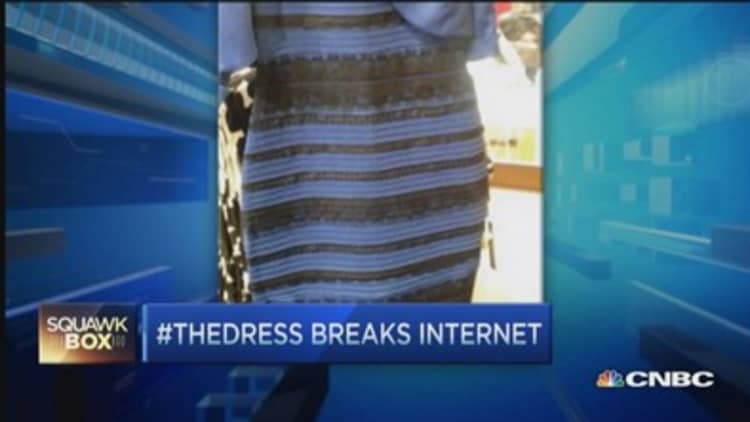
BuzzFeed is losing its mind over it. The photo is tearing friends and families apart. People can't stop looking, deciding and tweeting.
#TheDress, or a poorly lit photograph of a garment valued at $77.13, is a legitimate social media phenomenon. The reason: Some viewers of the now-famous picture think the dress is black and blue, while others say it's gold and white. Media companies have asked color experts, scientists and the U.K.-based dressmaker—which is reportedly cashing in big—to weigh in, while the original story from BuzzFeed has now been viewed more than 28 million times in less than a day.
Brands in practically every industry have attempted to squeeze themselves in on the conversation with some clever and not-so-clever tweets.
So how did a single ambiguous dress go viral?
A 21-year-old singer by the name of Caitlin McNeill says she posted the photo to Tumblr after her friend, who is getting married, began arguing with her fiance over the color of the dress. The couple didn't actually have the dress in front of them, she says, but were looking at a photo of the dress, which was sent to them by the bride's mother, who was planning on wearing it. Once the photo made it to Tumblr, the Internet lit up.
Regardless of what color the dress actually is, this much is clear: When it comes to viral, the person who takes or posts the soon-to-be famous photo often takes a backseat to the person, product or event featured in the photo.
Read MoreThe dress that broke the Internet
Outside of a handful of interviews and 15 minutes of fame, it's unlikely the Tumblr poster (McNeill) and, even worse, the photographer (the bride's mom) will see much money from the online sensation. At the end of the day, it will likely be the dressmaker (and BuzzFeed) who will be frolicking down the yellow brick road—a road built by McNeill and her friend's mom—in a quest to cash a check at the Internet's viral bank.
Are photographers and original content creators getting burned in the world of virality?
"If you're putting stuff on the Web with the expectation of a payday, you're gonna have a bad time," said Neetzan Zimmerman, a senior director of audience and strategy at TheHill.com.
Read MoreThe pearly Oscar dress Lupita Nyong'o wore? Stolen!
"The 'participatory Web' is a lot like the social contract. When you sign it, you lose some rights to gain others. You lose the right to fully own the content you make public, but in return you get a chance to be in the spotlight and make the most of it."
It's almost as if the photographer doesn't exist. In a Huffington Post article titled "Everything You Need To Know About The Dress," the author fails to mention that the photo was not taken by McNeill, and described the string of events as beginning with McNeill's post to Tumblr. Separately, the author of BuzzFeed's popular article, Cates Holderness, tweeted, "All credit goes to [McNeill] for #TheDress."
Last year, a Target employee by the name of Alex Lee became an Internet wonder after a teenager snapped his photo at the checkout line. #AlexFromTarget quickly became a trending topic across the world, while the photographer and tweeter didn't get much in return. Lee eventually ditched his job at the retailer to pursue a career in music.
Read More Madonna fell over and Twitter went crazy
Should #AlexFromTarget or the dressmaker compensate those who helped launch them into stardom?
"Alex never asked to have fame thrust upon him, so he doesn't really owe anyone anything," said Zimmerman. "In this particular case, the same is true for the dressmaker. This was not a marketing campaign or paid media, this was a happy accident."
Still, it appears McNeill and the photographer will be getting more than just a thank you note.
"We've been reaching out to Caitlin and the bride's mother because we'd love to offer them a couple of free dresses," a spokesman for Roman Originals, the maker of the dress, told CNBC.com.
Zimmerman recommends that photographers and content creators "make every attempt to ensure that they're being properly credited. Beyond that, if they are the kind of person who has the time and resources to exploit the situation (a la Rebecca Black) they should absolutely be doing that as well. Mostly, though, once the Internet grabs hold of something, any value it had for the originator diminishes rapidly."


